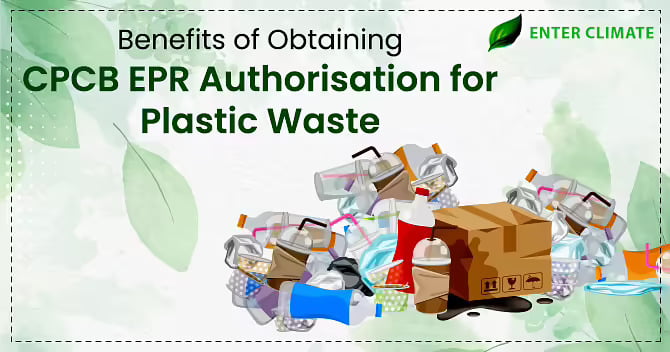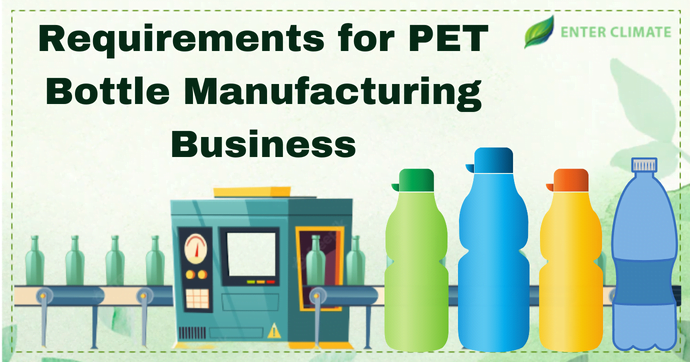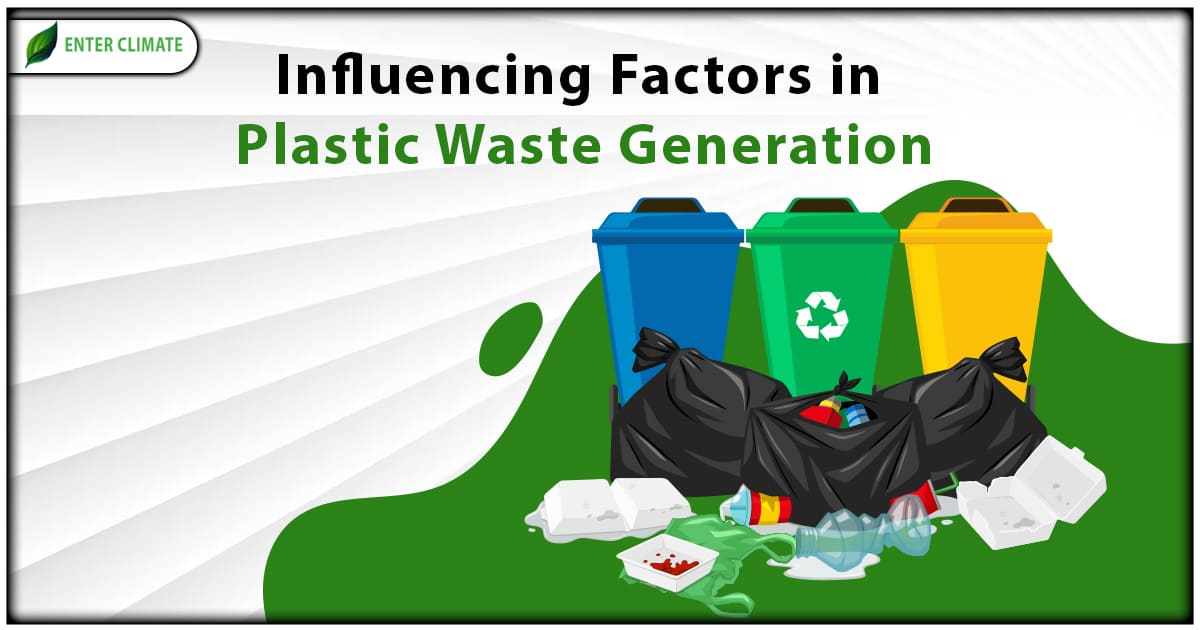Benefits of Obtaining CPCB EPR Authorisation for Plastic Waste
 13 Aug, 2022
13 Aug, 2022 
The industrialisation has mainly contributed to the development of the world with the introduction of mass manufacturing and assembly process to increase production and maintain the influx of new products in the market. But this influx of products and gadgets in the market, along with rising consumerism, has resulted in the accumulation of waste of worn-out or end-of-life products causing severe environmental and health problems. Consequently, to address this problem government and various authorities took many measures, including implementing new laws, focusing on recycling, and shifting the focus to a circular economy, but then also, in reality, these measures seem to have no impact on improving the condition of environment mainly due to a lack of incentive from various stakeholder including Producers’ and manufacturers’.we discuss about CPCB EPR Authorisation.
Therefore, to make producers liable and positively impact the environment, the policy of “Extended Producers’ Responsibility” was introduced. The Extended Producers’ Responsibility concept was introduced as an environmental policy by Thomas Lindqvist of Sweden in 1990. He put forth the EPR model that defines five types of responsibilities essential for implementing a successful EPR Model: informative, economical, liability on damage, physical, and owner responsibility.
Extended Producers’ Responsibility under Plastic Waste (Management) Rules, 2016
Under Plastic Waste (Management) Rules, 2016 Extended Producers’ Responsibility is defined “as the accountability of a manufacturer for the environmentally sustainable management of the manufactured good still the end of its life”, holding every producer’s, manufacturer, recycler, reuser, dismantler, and gram panchayat responsible for proper management of Plastic Waste.
Before the implementation of Extended Producers’ Responsibility, the Urban Local Bodies/ Nagar Palika/ Municipalities/ Gram Panchayats were mainly responsible for the management of plastic waste, which over time, with the increase of waste, became very difficult for them to do.
Therefore EPR enables these facilities a relief along with: –
- Lessing the economic load
- Inclusion and formalisation of the informal sector
- Boosting producers toward sustainable product and packaging
- Encouraging waste management and the recycling sector.
Extended Producers’ Responsibility under Plastic Waste Management dictates not only the activity of collection of plastic waste but also the following activities:
- Plastic Waste Minimization by design innovation.
- Source Segregation
- Collection of Plastic Waste through
- Encouraging and recognising Waste Picker
- Households or any other source of segregation
- Waste Processing and Recycling through
- Material Recovery Facility
- Waste Processors and Recyclers
The benefit of CPCB EPR Authorisation
Some of the benefits of CPCB EPR Authorisation are: –
- Improve waste supply management and chain
Extended Producers’ Responsibility authorisation targets the weak points in the supply chain and provides a mechanism to strengthen it by reducing overhead costs and lessening the burdens. It also ensures the availability of defined provisions that navigate the producers without hiccups and lags.
- Improve management with associated units
Extended Producers’ Responsibility authorisation provides producers with effective policies to navigate through the management system, including channelising waste to recycling and disposal units.
- Improved Market Status
Many Companies and producers register with CPCB EPR Authorization to improve their market standing and goodwill as it indicates the company’s willingness to protect the environment and their commitment to sustainable use of resources.
- Increase efficiency of waste management
Extended Producers’ Responsibility authorisation allows the stakeholder to have better transparency in the collection, treatment, recycling, or disposal process, making the process more efficient and smooth.
Process of CPCB EPR Authorisation
Extended producers’ Responsibility in India is implemented to regulate the manufacturing units or working of Producer of E-Waste or Plastic Waste which are further managed in accordance with the E-Waste (Management) Rules, 2016 and Plastic (Management) Rules, 2016[2].
CPCB EPR Authorisation under Plastic Waste (Management) Rules
PIBO (Producers’/Importers/Brand Owner) has to obtain CPCB EPR authorisation under the Plastic Waste (Management) Rules, 2016. They have three other possibilities for the implementation of the extended producers’ Responsibility action plan:-
- Plastic Waste Management is done by direct engagement with Urban Local Body
- Plastic Waste Management through an appointment with a waste management agency (WMA)[1], which in turn should involve the Urban Local Body.
- Plastic Waste Management by their own circulation network.
Process of registration
Before initiating the process of Authorisation, the PIBO (Producers’/Importers/Brand Owners) have to make sure that if the operation of the manufacturing unit is in 1 or 2 states, then they have to submit the application to The State Pollution Control Board of that particular state but is the manufacturing units span for more than two states than they have to submit to The Central Pollution Control Board. The process of CPCB EPR authorisation involves procedure with the following steps:-
- PIBO (Producers’/Importers/Brand Owners) are obligated to apply for the CPCB EPR Authorisation by satisfying up an application providing comprehensive info on the plant/enterprise and personal details. This application can be completed through the online registration portal with the mandatory documents.
- Producers need to submit FORM I. whereas all manufacturers need to file FORM III, and all recycler or individuals involved in the recycling process needs to fill FORM II.
- The application filled as per the stipulated guidelines will be sent along with the mandated documents.
- The related authority will verify or sign the documents.
- The form is then submitted to the State Pollution Control Board.
- The State Pollution Control Board or Pollution Control Committee scrutinises the application for insufficiencies which is then conversed to the applicant within seven working days.
- If the applicant has not responded within thirty days after a response from the State Pollution Control Board or Pollution Control Committee, the application is presumed to be withdrawn.
- Further in case, within 30 days of the filing of the complete application with the binding document, there is no reply from the central pollution control board or State Pollution Control Board. Then, the registration certificate will be acknowledged to have been granted.
Documents required for CPCB EPR Registration under Plastic Waste Management Rule
- More than two states’ proof of sale (GST/tax invoice, etc.)
- A District Industrial Centre certificate is required if the unit has a production facility.
- The Air and Water Act requires valid consent if the unit contains a production facility.
- Documents about the EPR Action Plan (The process of filing the EPR Plan includes accumulating the data on the generation of their end-of-life products, Summarizing a scheme for Transportation and collection of their end-of-life products, the projected budget for executing EPR, and a declaration on RoHS (restriction of hazardous substance) compliance, and design of the scheme of creating awareness.)
- Document relating to Producers’/Importers/Brand Owners/Waste Management Authority engagement issued by ULB / authorised state authority (as applicable)
- The State Pollution Control Board or Pollution Control Committee issues registrations to Plastic Waste Processing Facility in order for them to work with them on Plastic Waste processing. The State Pollution Control Board or Pollution Control Committee enters into a Plastic waste processing agreement with the Plastic Waste Processing Facility (as applicable)
- Producers’/Importers/Brand Owners and Waste Management Authority agreement (as applicable)
Conclusion
CPCB EPR Authorization is the essential requirement for the PIBO (Producers’/Importers/Brand Owners) who are working under the field stipulated by Plastic Waste (Management) Rules, 2016, further implying the willingness of producers to bear their responsibility towards the environment, growing mountains of plastic waste and sustainable waste management.
Categories
Latest Post
Air pollution Dispersion Modeling
Natural Disaster Risk Assessment
Endangered Species Protection
Aquifer Recharge Project
Sustainable Sanitation Solutions














